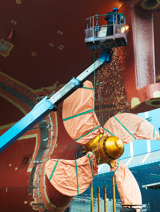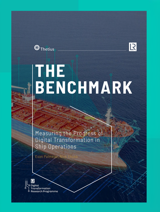The Cargo Fire & Loss Innovation Initiative is calling for innovators to come forward with solutions for early-stage fire detection, one of the most important issues in the drive to mitigate container loss.
The Cargo Fire & Loss Innovation Initiative (CFLII), a technology acceleration initiative to reduce cargo fires and losses overboard, is asking technology providers to come forward to solve the issue of fire detection in cargo holds.
Launched in February this year by Safetytech Accelerator, the programme comprises Lloyd’s Register, Seaspan, Evergreen Line, HMM, Maersk, the Offen Group and ONE and was established with the aim of reducing cargo loss at sea by shaping joint requirements, identifying technology solutions, undertaking carefully designed trials and developing best practices and recommendations.
Following extensive knowledge sharing among the group, the need for improved fire-detection systems in container cargo holds has been identified as the most pressing area of focus. Early fire detection, or identifying a fire-risk prior to ignition, is critically important to minimise the likelihood of a large-scale fire, therefore advancing successful containment without the creation of significant loss and any associated marine impact.
The Initiative is therefore calling on technology companies to come forward with suitable solutions in early-stage fire detection for cargo holds. This open call is looking for low-cost, robust solutions with the appropriate form factors to operate in the cargo-hold environment. Interested technology companies should outline how the proposed solutions will deliver these requirements. Technology companies with potential solutions to the challenge are being encouraged to submit applications here by the end of May.
Initial analysis carried out by Safetytech Accelerator shows that the opportunities for advancing potential solutions to solve this are substantial. We are approaching a tipping point where these technologies are maturing in terms of both cost and effectiveness to make an impact.
Rich McLoughlin, Head of Maritime Engagement and CFLII Programme Director at Safetytech Accelerator said: “There is a real need to understand how technology can help container operators minimise fire risk. Although we are seeing incredible efforts being made by industry in other areas - such as screening for the mis-declaration and non-declaration of dangerous goods - there continues to be fire risks associated with commonly shipped container cargoes. The Initiative has identified this as a key area of interest, and we are keen to push the boundaries on current practice.”
Alfred Gomez, Director Marine Standards and Designated Person Ashore (DPA) at Seaspan Corporation said: “From an industry perspective this subject is a real priority. Ships are larger in size and have exponentially increased their carrying capacity, including dangerous goods, increasing the risk of threat to the safety of lives, vessel, cargo, and the environment. There has been little or no innovation in fire detection systems in the cargo hold to keep up with the way shipping has evolved.”
“Precious minutes lost in identifying cargo hold fires can make the difference between minor and major losses. This initiative spearheaded by Safetytech Accelerator, including leading container operators, provides us with an exceptional platform to further discuss the challenges and limitations, while exploring creative solutions. We look forward to this robust partnership to jointly come up with a ground-breaking, practical, and reliable solutions which will further our quest to detect fires in cargo holds early and protect the safety of our colleagues at sea and the ecosystems in which we operate.”
To apply, please follow this link





